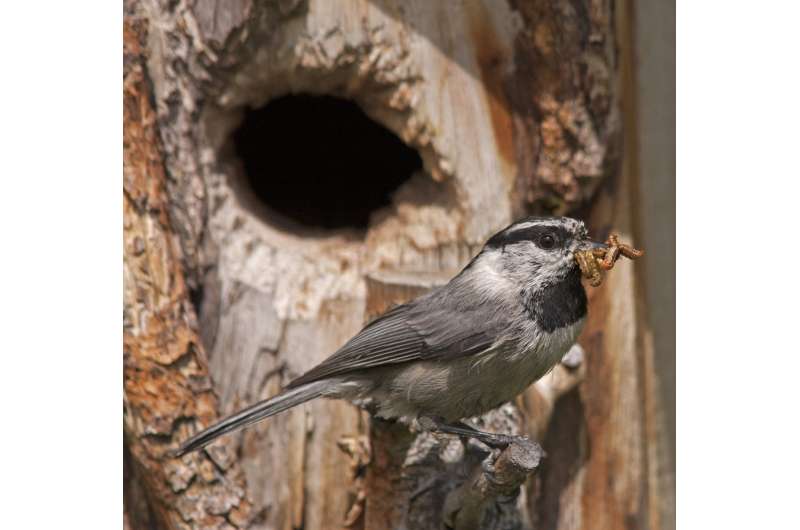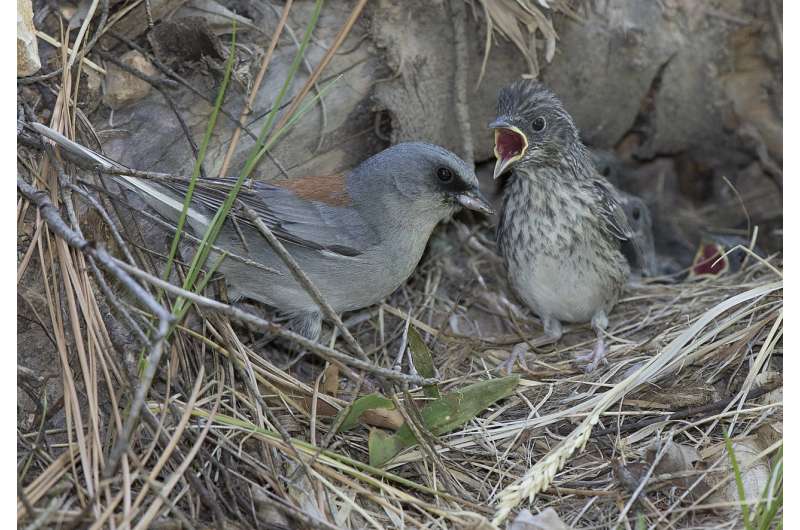June 21, 2018 report
How fledglings and their parents negotiate the best time for young birds to leave the nest

A team of researchers at the University of Montana has found that fledglings and their parents must negotiate to find the right time for the young birds to leave their nest. In their paper published on the open access site Science Advances, the group describes their study of many types of birds and how they figured out when fledglings should leave the nest.
Many birds build nests to lay their eggs and to hold the young after they hatch until they grow old enough to fly on their own. But how do the baby birds and their parents know when it is time for them to leave? That question, the researchers point out, has not been studied very much. For that reason, they designed and carried out a study to find the answer.
The study consisted of videotaping 11 types of songbirds using a high-speed camera—that allowed them to gain a better understanding of the flying skills of birds. They also watched as the birds grew older and carefully noted the time points at which the young birds left the nest—and how they fared.
The researchers found that there were differences between species—some parents allowed their offspring to stay in the nest longer while others did not. There were also differences in mortality rates between species. Those that left the nest earlier found it tougher going than those that stayed in the nest longer—fewer of them survived because they had not yet developed strong flying skills. On the other hand, young birds that hung around in the nest longer were more likely to attract predators because they were noisier—increasing the likelihood of the whole brood being eaten. The researchers also found that under artificial conditions in which they forced some parents to keep their young in the nest for a few extra days, the mortality rate was lower—not only did the young birds have more time to develop, they were also protected from predators.
The researchers suggest that their findings indicate that parent birds and their young must negotiate an optimal time for the young to leave, balancing the dangers of staying longer versus leaving earlier.

More information: Thomas E. Martin et al. Age and performance at fledging are a cause and consequence of juvenile mortality between life stages, Science Advances (2018). DOI: 10.1126/sciadv.aar1988
Abstract
Should they stay or should they leave? The age at which young transition between life stages, such as living in a nest versus leaving it, differs among species and the reasons why are unclear. We show that offspring of songbird species that leave the nest at a younger age have less developed wings that cause poorer flight performance and greater mortality after fledging. Experimentally delayed fledging verified that older age and better developed wings provide benefits of reduced juvenile mortality. Young are differentially constrained in the age that they can stay in the nest and enjoy these fitness benefits because of differences among species in opposing predation costs while in the nest. This tension between mortality in versus outside of the nest influences offspring traits and performance and creates an unrecognized conflict between parents and offspring that determines the optimal age to fledge.
Journal information: Science Advances
© 2018 Phys.org





















